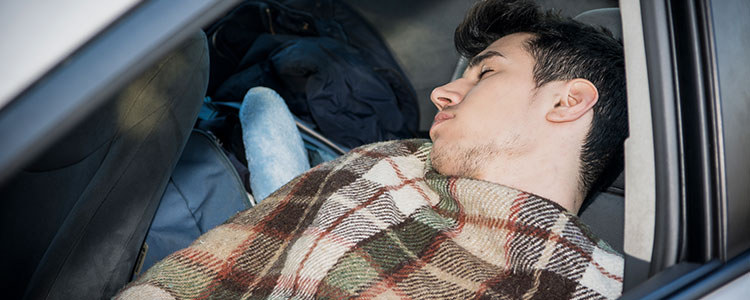Indiana, the “Hoosier State,” offers a wealth of experiences for travelers, from exploring Indianapolis’ vibrant museums to witnessing breathtaking natural beauty in places like Brown County State Park. However, road trips, unexpected delays, or tight budgets can sometimes lead to the need for unconventional sleeping arrangements. This is where car sleeping comes in. For some, it might be a last resort, while others may choose it for affordability or adventure.
A Complex Issue: Legality Varies by Location and Circumstances
The legality of car sleeping in Indiana, however, is not a straightforward answer. Unlike some states with clear-cut laws, Indiana presents a patchwork of regulations depending on location and circumstances. This article will navigate the complexities of car sleeping in the Hoosier State, exploring the legality on both public and private property, addressing concerns related to DUI laws, and suggesting alternative solutions for those seeking overnight accommodations.
Sleeping in Your Car on Public Property in Indiana
Public property offers readily available space for car sleeping, but legal restrictions can vary significantly. Here’s a breakdown of the key areas to consider:
- State vs. Local Laws: The Patchwork of Regulations
Indiana lacks a statewide law specifically addressing car sleeping. This means the legality falls under the jurisdiction of local municipalities. Cities and towns often have their own ordinances regarding overnight parking, loitering, and public camping, which can indirectly impact car sleeping. Therefore, it’s crucial to research the specific laws of the area you plan to stay in. Resources like municipal websites or contacting local law enforcement can provide clarity.
- Rest Areas: No Overnight Stays in Indiana
Indiana Department of Transportation (INDOT) prohibits overnight parking at rest areas. Signage is typically posted informing visitors of the regulation. This is likely due to concerns about safety and potential misuse of rest areas for extended stays.
- Walmarts and Casinos: Permission Required for Overnight Parking
While some Walmarts and casinos across the country allow overnight parking with permission, this is not a guaranteed privilege in Indiana. It’s best to inquire with the specific store manager or security personnel beforehand to avoid any issues.
- Public Parks: Sleeping May Be Prohibited After Hours
Many public parks in Indiana close after sunset. Sleeping in your car after closing hours might be considered trespassing or violating park ordinances. Always check park regulations and posted signage to ensure car sleeping is permitted.
Sleeping in Your Car on Private Property in Indiana
Private property offers a potentially more controlled environment for car sleeping, but permission is paramount.
- Getting the Property Owner’s Permission is Key
Sleeping in your car on private property in Indiana is generally legal, provided you have the express permission of the landowner. This could be a friend, family member, or someone offering permission for overnight parking on their property (e.g., some landowners may allow car camping on their land for a fee).
- Risks of Sleeping in Your Car Without Permission
Sleeping on private property without permission can be considered trespassing. Landowners have the right to call law enforcement and have you removed.
Indiana DUI Laws and Sleeping in Your Car
A significant concern for car sleepers is the potential for a DUI (Driving Under the Influence) charge. Indiana has a zero-tolerance policy for drunk driving, with a blood alcohol content (BAC) limit of 0.08% or higher considered a DUI.
- The Importance of Intent: Avoiding a DUI Charge
The key factor in avoiding a DUI charge while sleeping in your car is demonstrably separating yourself from driving activity. Here are some safety tips:
Safety Tips: Separating Yourself from Driving Activity
- Keys Out of the Ignition: Remove the keys from the ignition and keep them separate from yourself. This indicates you have no intention of operating the vehicle.
- Move to the Backseat: If possible, move to the backseat or passenger seat of your vehicle. This further distances you from the driver’s position.
- Turn Off the Engine: Ensuring the engine is off and stays off further demonstrates you are not in control of the vehicle.
- Do Not Attempt to Drive While Intoxicated: This should go without saying, but never operate a vehicle if you are under the influence of alcohol or other intoxicants.
Important Note: While the guidelines above can help minimize the risk of a DUI charge, it’s important to know that legal interpretations and enforcement of these laws can vary. If you’re sleeping in your car and are concerned about potential DUI charges, it’s advisable to contact legal counsel for clarification.
Alternatives to Sleeping in Your Car in Indiana
While car sleeping offers flexibility, there are alternatives to consider based on needs and preferences. Here are a few options for overnight stays:
- Hotels and Motels: Traditional Lodging Options
Indiana boasts a broad array of hotels and motels to suit different budgets and locations. These offer amenities like comfortable beds, bathrooms, and often complimentary breakfast.
- Campgrounds: Budget-Friendly Overnight Stays
Indiana state parks and private campgrounds provide a chance to connect with nature while offering basic amenities like bathrooms and showers. Camping fees are generally far more affordable than traditional lodgings.
- Truck Stops: Some Allow Overnight Parking for a Fee
Designated truck stops typically have large parking areas and may offer overnight parking for a small fee. Some include restrooms and sometimes shower facilities.
Conclusion: Making Informed Decisions about Car Sleeping in Indiana
Car sleeping in Indiana is a complex issue without a simple yes or no answer. The legality is determined by a patchwork of local laws, potential DUI concerns, the distinction between public and private property, and respecting property ownership rights.
When faced with the need to sleep in your car in Indiana, it’s always best to follow these guidelines:
- Research Local Ordinances: Investigate specific regulations for the city or town you intend to stay in.
- Seek Permission Where Required: Obtain the landowner’s consent before sleeping on private property. Contact Walmart store managers or casino security for overnight parking inquiries.
- Practice Safety: Follow the safety tips to minimize the risk of a DUI charge if you have consumed alcohol.
- Explore Alternatives: Consider the range of hotels, motels, campgrounds, and truck stops available as potential overnight lodging options.
By understanding the nuances of car sleeping laws in Indiana and exercising caution, you can make informed decisions and avoid legal issues while prioritizing your safety and well-being.
Sources:
- Hayes Law Office: Is it legal to sleep it off in your car in Indiana?: https://www.thehayeslawoffice.com/blog/2024/01/is-it-legal-to-sleep-it-off-in-your-car-in-indiana/
- SmartFinancial: Is It Illegal To Sleep in Your Car?: https://smartfinancial.com/is-it-illegal-to-sleep-in-your-car
- Indiana Department of Transportation (INDOT): https://www.in.gov/indot/
Disclaimer: This article is intended for informational purposes only and should not be considered legal advice. If you have specific questions about the legality of car sleeping in Indiana, it is best to consult an attorney familiar with state and local laws.



